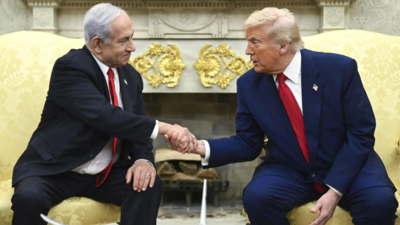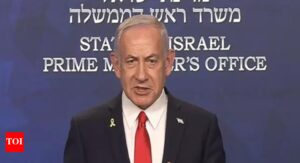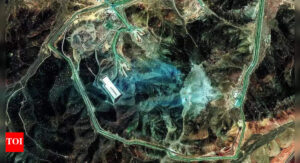From Donald Trump to Benjamin Netanyahu: The biggest winners of the Middle East conflict – and losers | World News
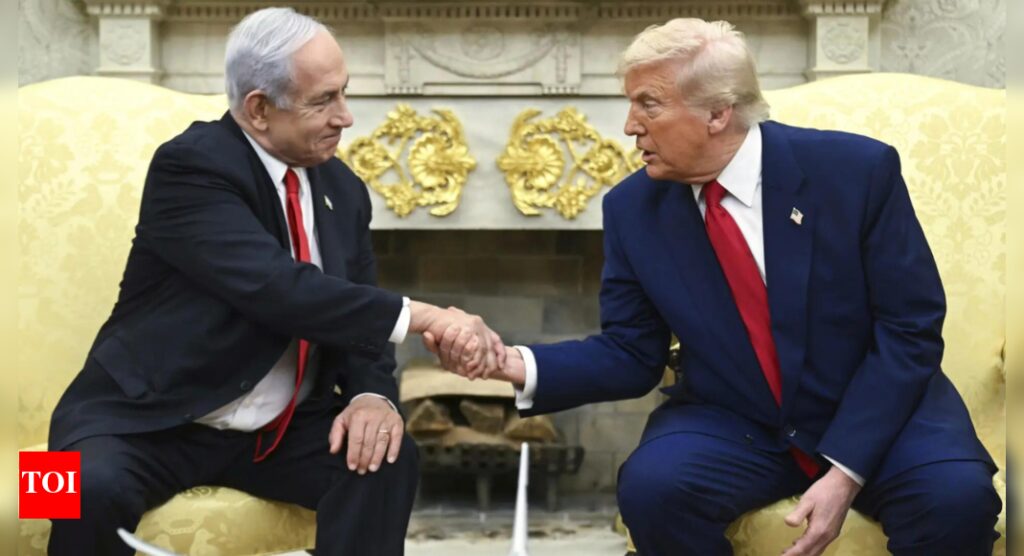
Most shows are defined by their endings. House MD saw the misanthrope Gregory House hang up his proverbial lab coat – the one he refused to wear – to go on a joyride with his cancer-stricken best buddy.Walter White killed the men who had swindled him out of his drug empire with a rigged machine gun.Heroes lowered the standards so much we didn’t care what happened after Season 2, but if there’s one show which was defined by its opening, instead of its ending, it was Newsroom. That show was defined by how it began.
Will McAvoy’s monologue on American greatness became so iconic that it was practically ghostwritten for Vivek Ramaswamy’s doomed 2024 presidential campaign—before being mugged by MAGA.In that monologue, McAvoy says America leads the world in three things: incarcerations, belief in angels, and defence spending—where it spends more than the next 26 countries combined, 25 of whom are allies.That was over a decade ago. China and Russia have since tried to close the gap. They failed. And the recent strikes in Iran were a reminder of why.While there’s a cliché that there are no winners in war, the truth is that most often the victor is America, unless of course it gets into a protracted engagement with a nation of guerilla warriors who can hide in caves or under the ground.So, who are the winners and losers of the recent gun-slinging in the Middle East?
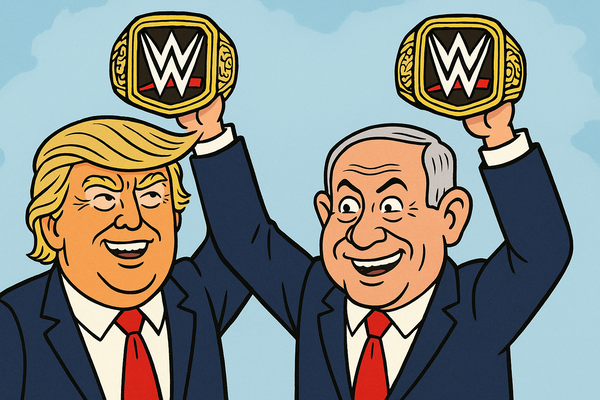
Winners
Donald Trump – The Don is Back

President Donald Trump speaks with reporters before boarding Marine One on the South Lawn of the White House, Tuesday, June 24, 2025, in Washington. (AP Photo/Evan Vucci)
Many years ago, 1980 to be specific, Donald Trump made his first comment on foreign policy when he wondered out loud during a vanity interview why a powerful country like America couldn’t deal with the Iran hostage crisis. The notion that America, with all its might, couldn’t get anything done felt like a personal affront and since then Trump’s enmity for Iran has been on par with his disdain for Barack Obama.As Jack Blanchard pointed out in Politico: “Trump is in no doubt: The president believes — with some justification — that he has proved his critics wrong. America has asserted its military dominance in the region. Iran’s nuclear programme has taken a severe blow. The pushback has been almost nonexistent. And that much-feared ‘forever war’ lasted less than 12 days. Trump is chalking this up as a comprehensive win.”In one stroke, he dismantled Biden’s diplomatic era waltz with Tehran and Barack Obama’s JCPOA legacy.So, what really is the Trump Doctrine? It’s simply: We are America. We do what we want.
US Military-Industrial Complex (and B-2 Spirit Bombers)
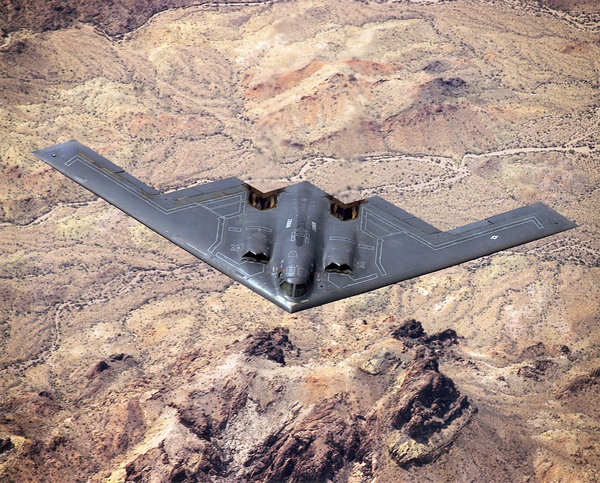
In recent years, the US Military-Industrial Complex has often become the butt of jokes for its liberal posturing, pride parades, or generals in drag, but with seven B-2 Spirit Bombers, America proved that they can change the face of any country the moment they choose to.Operation Midnight Hammer – a 37-hour sortie – didn’t just hit Iran’s nuclear programme – but it was a live demonstration of the might of Uncle Sam and its defence contractors. Think of it as the world’s deadliest product demonstration.Seven B-2 Spirit bombers, each priced north of $2 billion, flew from Missouri to Iran and back—13,000 kilometres—without being detected. They dropped 14 earth-penetrating GBU-57A/B Massive Ordnance Penetrators, each weighing over 30,000 pounds and costing upwards of $10 million. Tomahawk cruise missiles followed from submarines in the Arabian Sea, launched like afterthoughts in a fireworks display.It was an end-to-end validation of every funding request the Pentagon made, and overnight B-2s went from semi-retirement anonymity to mythical status. No country should live with the delusion that it can match America once it decides to enter the war. The last two world wars prove that.
Benjamin Netanyahu – Bibi’s Churchillian Redemption Arc
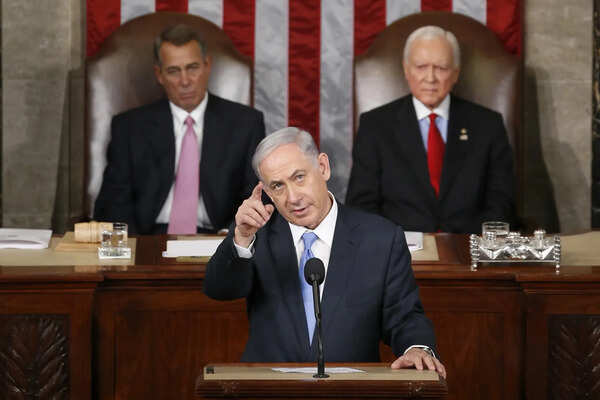
FILE – Israeli Prime Minister Benjamin Netanyahu gestures while speaking before a joint meeting of Congress on Capitol Hill in Washington, March 3, 2015. (AP Photo/Andrew Harnik, File)
Before reality differed, Yahya Sinwar, the fourth Hamas chief and the architect of October 7, made a grave mistake.He overestimated the capability of the Axis of Resistance, and as Jeffrey Goldberg wryly noted in a fantastic piece in The Atlantic, “underestimated the desire of Israelis to live in their ancestral homeland.”Isaiah 51:3 promised to turn Zion’s deserts into Garden, her wastelands into the Garden of the Lord, and while that particular promise wasn’t kept—forcing Jews to become lawyers, scientists, artists, bankers and pretty much everything worthwhile in Western civilisation—it also ensured that once Israel got its piece of land, no force on earth would move them from there.And one beneficiary of that was a former MIT engineer.After October 7, 2023, Bibi was a dead man walking, a political career running on its last fumes with Mr Security’s image in tatters. Two years later, he has undergone his full Churchillian makeover—even ensuring some starvation for his opponents—and his biblical quest for revenge shows no signs of slowing.From exploding pagers to bunker-busters, Israel has methodically dismantled its enemies—with Khamenei seemingly surviving only because of Trump’s largesse. Israel has destroyed Hamas’ leaders in Gaza, struck the Houthis in Sana’a, collapsed Assad’s regime in Syria, severed Iran’s supply lines, and left scores of Hezbollah fighters dead in Yemen, effectively neutralising Iran’s proxies across five fronts.At the centre of it all, Netanyahu—once politically doomed—has emerged as the architect of a brutal, precision-led regional reset, much like the intermittent-fasting enthusiast he worships. Of course, the only twist in the tale will be if in his moment of Churchillian triumph, he ends up meeting his Atlee.
The NeoCons – MAGA who?
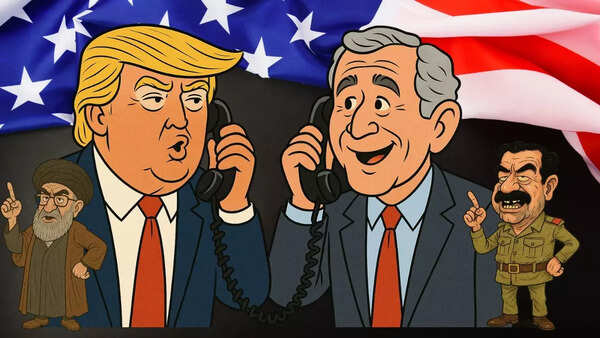
Once dismissed as relics of the Bush-era disaster, the neocons are back—and this time, they’ve hijacked the Trump train without firing a shot. Marco Rubio holds every single position of note in Washington. JD Vance has completely forgotten his pre-electoral stances and is writing long elegies defending whatever Trump does. Tulsi Gabbard has taken a quick U-turn on regime changes.On the other hand, the leaders who once gave MAGA its voice—Tucker Carlson, Steve Bannon, Marjorie Taylor Greene—have been pushed aside, reduced to white noise that can be tuned out with a little ketamine.The neocons haven’t just returned—they’ve won. No ground troops. No occupation. Just airstrikes, sanctions, and memos. And in a final act of irony, the movement that rose from the ashes of Baghdad now finds itself writing Iran’s obituary—under the very banner it once despised. Sure, Trump feels like Dubyaman 2.0 but for most Americans there’s barely any difference between bombing Iraq and bombing Iran.
The Losers
The Axis of (No) Resistance
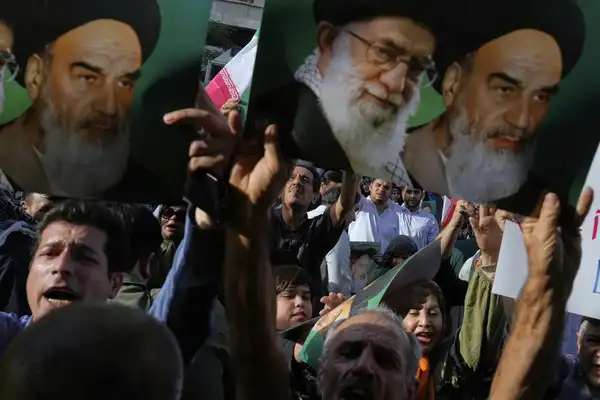
Iranian protesters hold up posters showing the Supreme Leader Ayatollah Ali Khamenei, center, and the late revolutionary founder Ayatollah Khomeini in a protest following the U.S. attacks on Iranian nuclear sites Sunday, June 22, 2025, in Tehran, Iran. (AP Photo/Vahid Salemi)
Perhaps the biggest loser of the entire fracas is the so-called Axis of Resistance – which was once hailed as a proud banner of anti-Western defiance – and is now something only found in liberal campuses in Western countries. Hezbollah’s strongholds in Southern Lebanon have become target practice for Israeli drones. The Houthis are bearing the brunt of Israeli-American strikes. Syria, post-Bashar, is very quiet about the entire thing. Iran’s grand strategy has imploded: no regional deterrent, no credible escalation, and no propaganda victory to offset the military rout. The image of an unbreakable Shiite crescent has given way to bomb craters, leadership vacuums, and strategic paralysis.
Palestine – A Geopolitical Afterthought
The gateway of global liberalism, Palestine has slowly faded into geopolitical afterthought. Its civil infrastructure is shattered, its people are displaced, and its voice drowned out by larger conflicts.With at least 54,000 Palestinians dead (according to the Gaza Health Ministry), the world has grown desensitised. The humanitarian crisis is among the worst in modern memory—over 1.9 million displaced, widespread famine conditions, hospitals inoperative, and more than 70% of Gaza’s buildings destroyed.The same nations that once called for ceasefires now focus on nuclear bunkers in Iran and Hezbollah convoys in Lebanon. The West Bank seethes with anger, but there are no cameras. Gaza is bleeding, but Tehran is trending. Palestine, which sparked this firestorm through Hamas’s October 7 attacks, has now been pushed to the margins of the narrative it ignited.
Pakistan – Real-Life Yes Minister
Each episode of Yes Minister has a similar premise. First, Minister Jim Hacker has an idea, then Sir Humphrey Appleby spends the episode convincing him it’s a bad idea and then eventually, Hacker comes around to believing whatever Appleby was pushing and that it was his idea in the first place.That’s also Pakistan’s national policy, where in true Orwellian fashion, day becomes night, and night becomes day. Take the last few days. First, General Munir – after giving himself a promotion to Field Marshal – visited the White House for a lunch with Trump and nominated him for the Nobel Peace Prize.Even as the repast was being digested, Pakistan had to condemn the US and Donald Trump for bombing Iran. While backing Iran is necessary to keep the quom at home quiet, it hardly yields any strategic gain. Meanwhile, the Trump outreach simply alienated civil society and religious parties, shaking hands with a man who just bombed a Muslim nation. Pakistan now finds itself diplomatically singed: embarrassed in Washington, distrusted by Tehran, and mocked at home.
China – Middle Kingdom Humbled
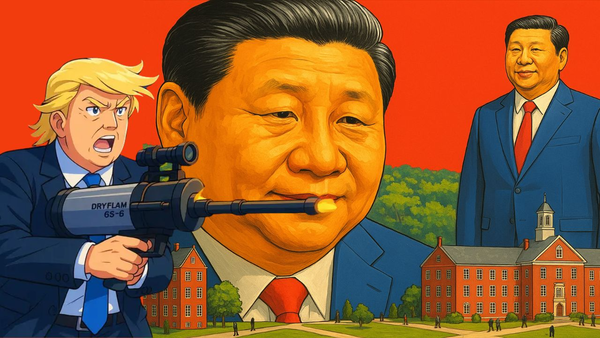
A civilisational power, China has always nursed a Middle Kingdom fantasy—unmatched in war, peerless in diplomacy. That illusion persisted until British gunboats shattered it in the opium-hazed 19th century. And yet, in recent years, Beijing has begun to believe its own myth again. It spoke of multipolarity, of “win-win cooperation,” of replacing Washington’s warcraft with Chinese statecraft. But when Iran burned, China blinked.The Belt-and-Road bonanza with Tehran promised roads and railways—but not rockets. Its 25-year pact with Iran offered infrastructure, not intervention. As US B-2 bombers reduced Fordo and Natanz to rubble, and Israel erased Hezbollah and Hamas leaderships one drone at a time, China issued a limp statement urging “restraint”—then promptly vanished from relevance.The truth is, for all the pageantry of great power diplomacy, Beijing now confronts the one question that cuts to the core of geopolitics: when it matters, can you make anyone stop? The answer is a firm ‘no’.
Russia – Only Love, No War (with US)

Russian President Vladimir Putin attends a plenary session of the St. Petersburg International Economic Forum in St. Petersburg, Russia, on Friday, June 20, 2025. (AP Photo/Dmitri Lovetsky)
A decade ago, Russia controlled Syrian skies and fancied itself the chessmaster of West Asia. Today, Vladimir Putin is too busy explaining away tank losses in Kharkiv to worry about missile strikes on Qom. Once hailed as Iran’s strategic partner, Moscow’s contribution to the US-Israel-Iran conflict has been limited to press statements and public sulking.When the bombs dropped on Fordo, Natanz, and Isfahan, Tehran’s foreign minister Abbas Araghchi rushed to Moscow expecting S-400s or at least some satellite intel. What he got instead was a handshake and vague condemnation. In private, Putin offered sympathy. In public, he labelled it “unprovoked aggression.” But in practice, Moscow didn’t lift a finger.Iran expected its strategic partner to show up. It got a spectator. There were no air defences, no drones, no aid—just more Kremlin press releases and a few tweets. Russia’s much-touted 2025 strategic pact with Iran, signed just after Assad’s fall, forbids helping Iran’s enemies—but notably doesn’t promise any help for Iran itself. It’s a paper tiger.Why the silence?Because Moscow has no capacity left. Its own war in Ukraine is draining missiles, air defences, and manpower. “Iran desperately needs such systems,” said Arman Mahmoudian, a research fellow at the Global and National Security Institute, in comments quoted by the Associated Press. “But Russia itself needs these very weapons… for its own war effort.” Translation: don’t expect any crates marked “From Russia with Love” to land in Tehran anytime soon.All in all, McAvoy was right and wrong. Americans might have a myriad problems back home, but it has the capabilities to bring the world to it heel whenever it wants. No matter how many people are incarcerated or believe in angels. As a viral meme joked as the B-2s set off for Iran: “The Supreme Leader is soon going to learn why Americans don’t have free healthcare.”
